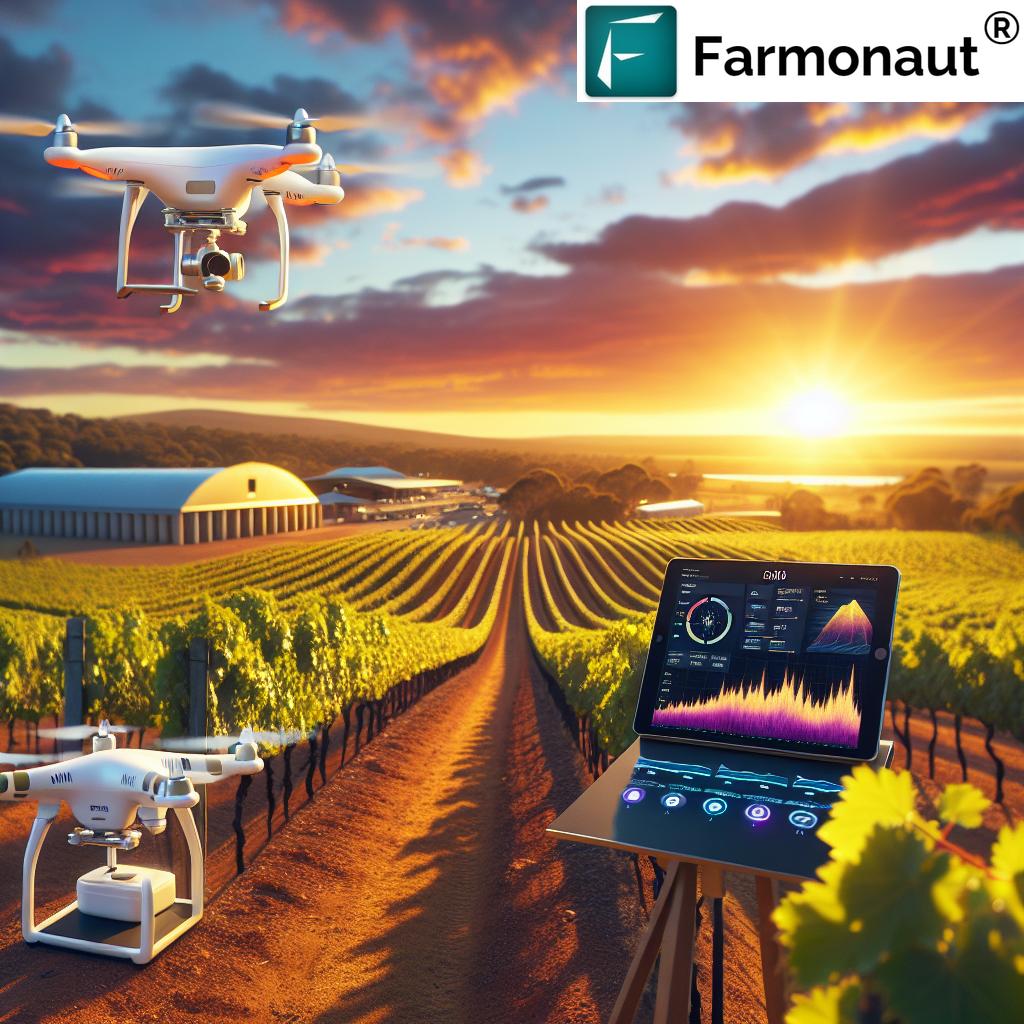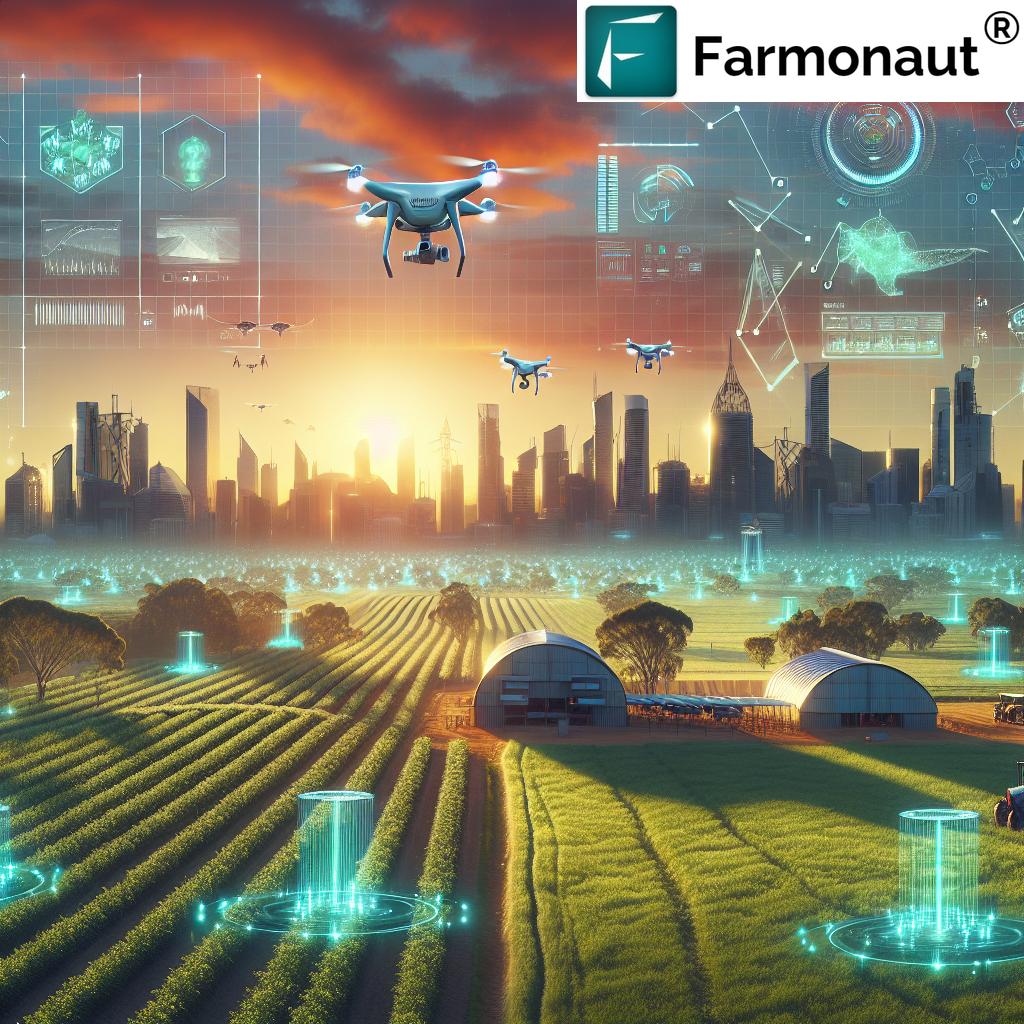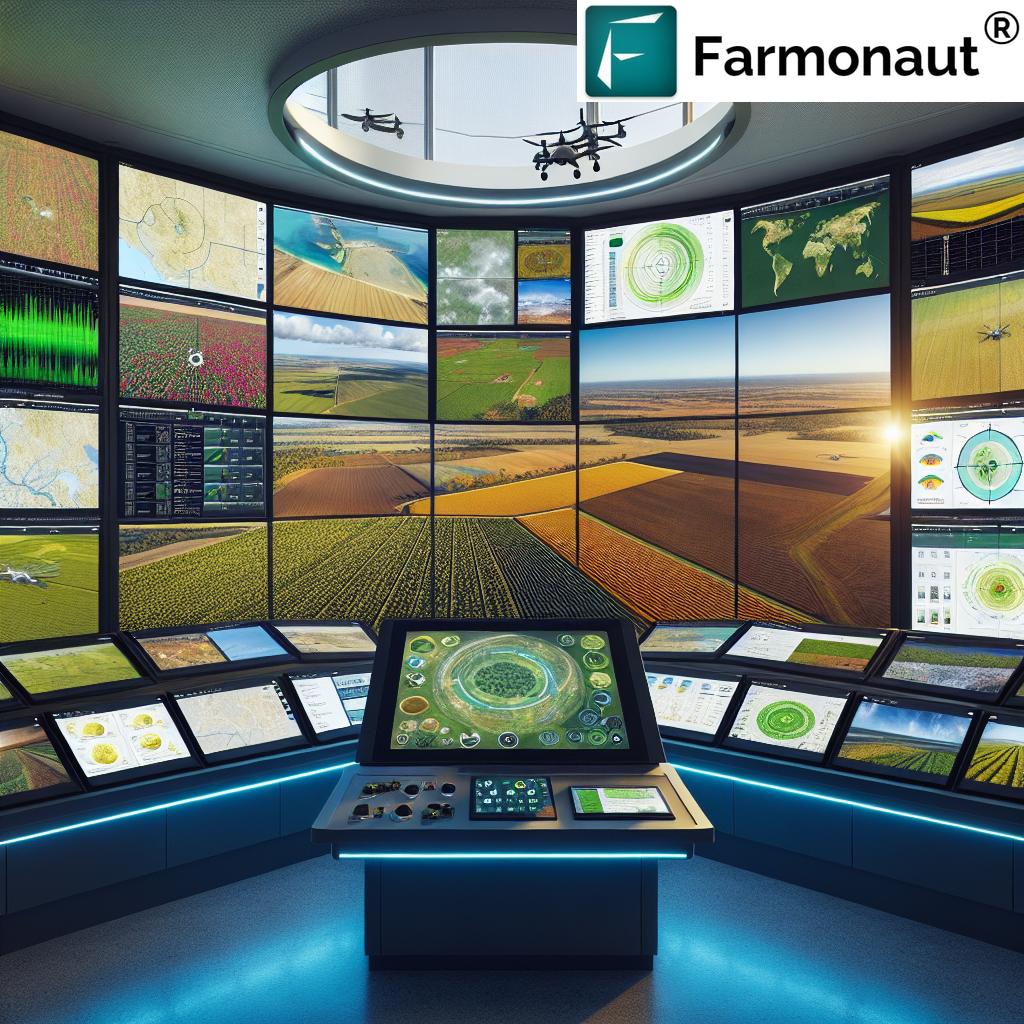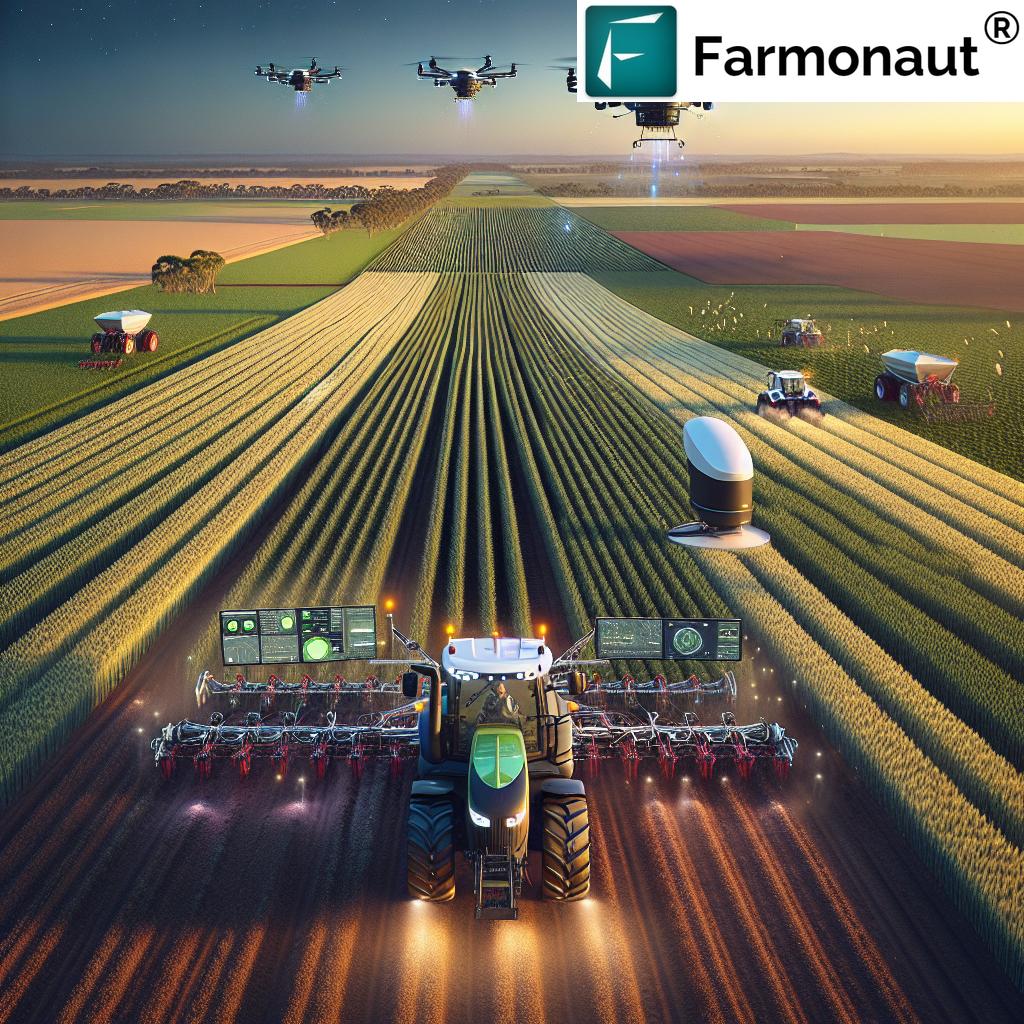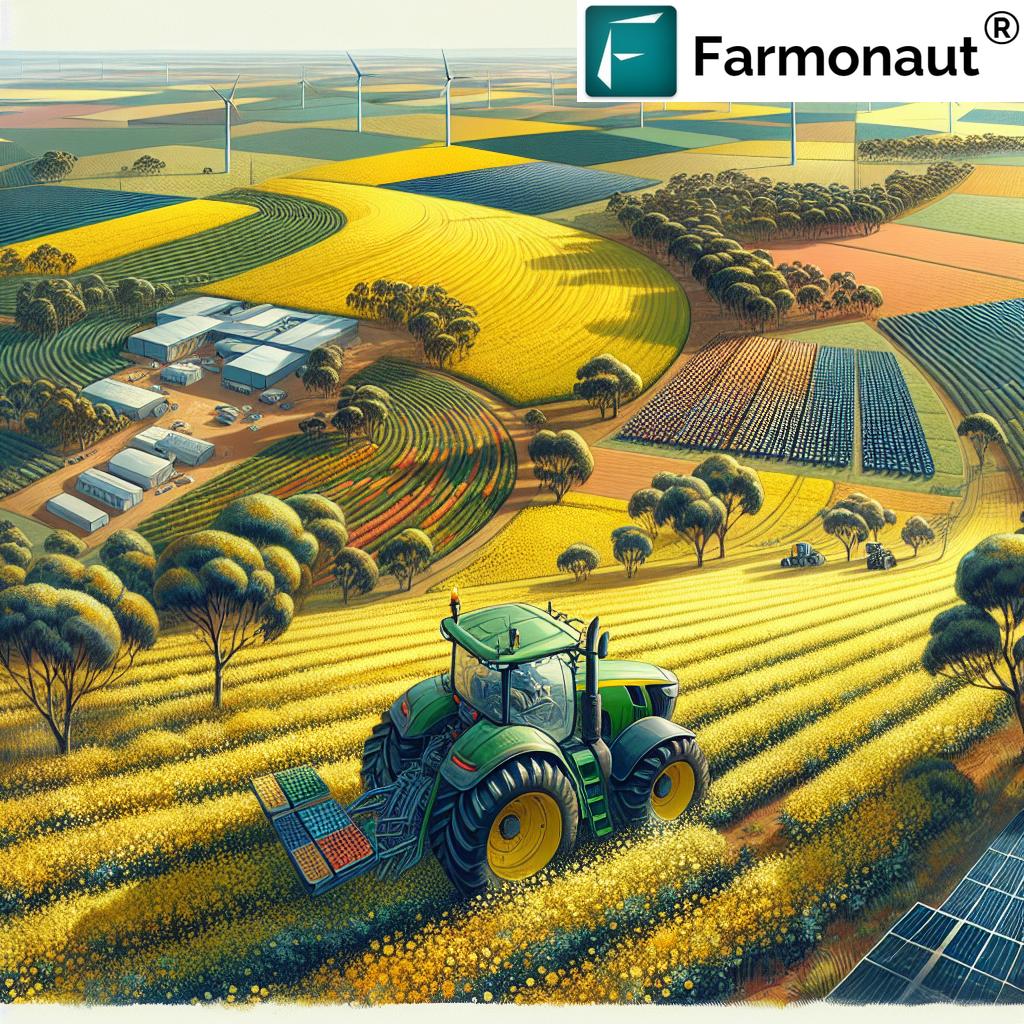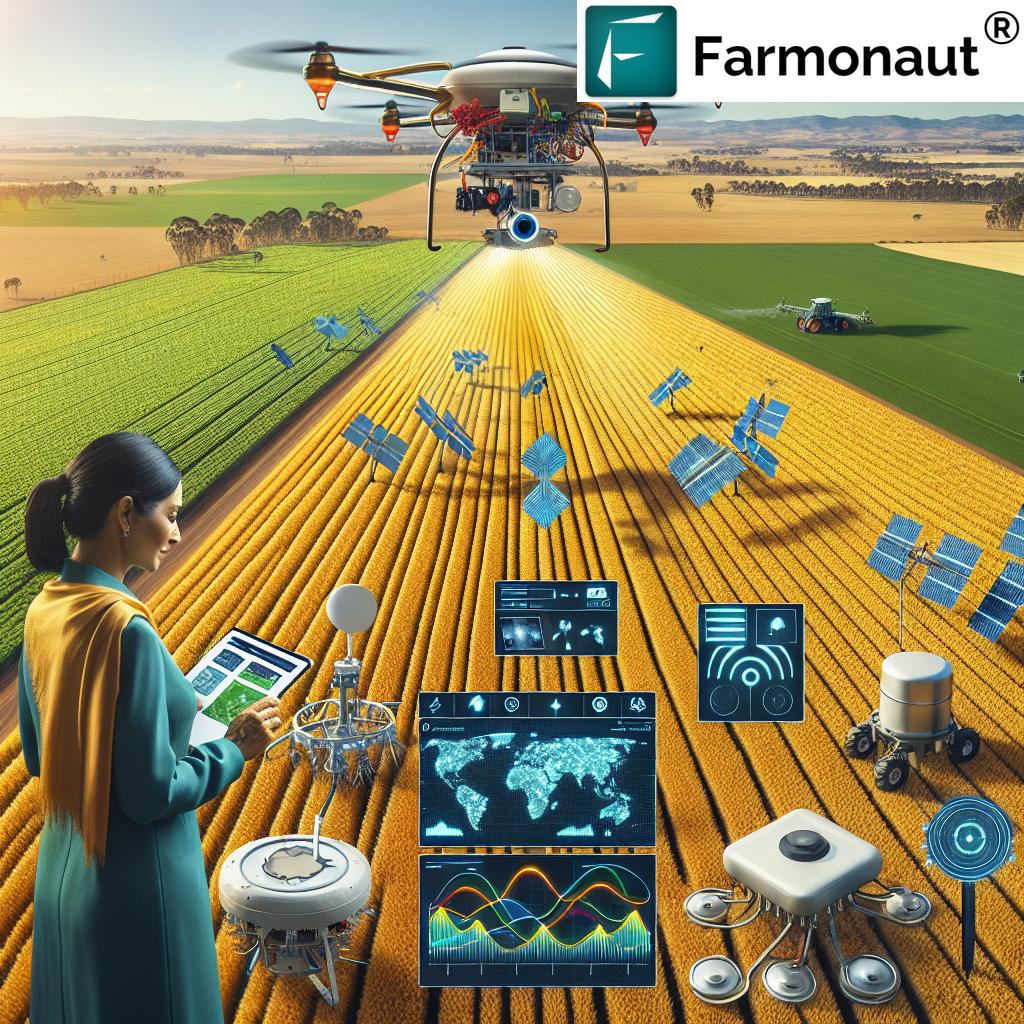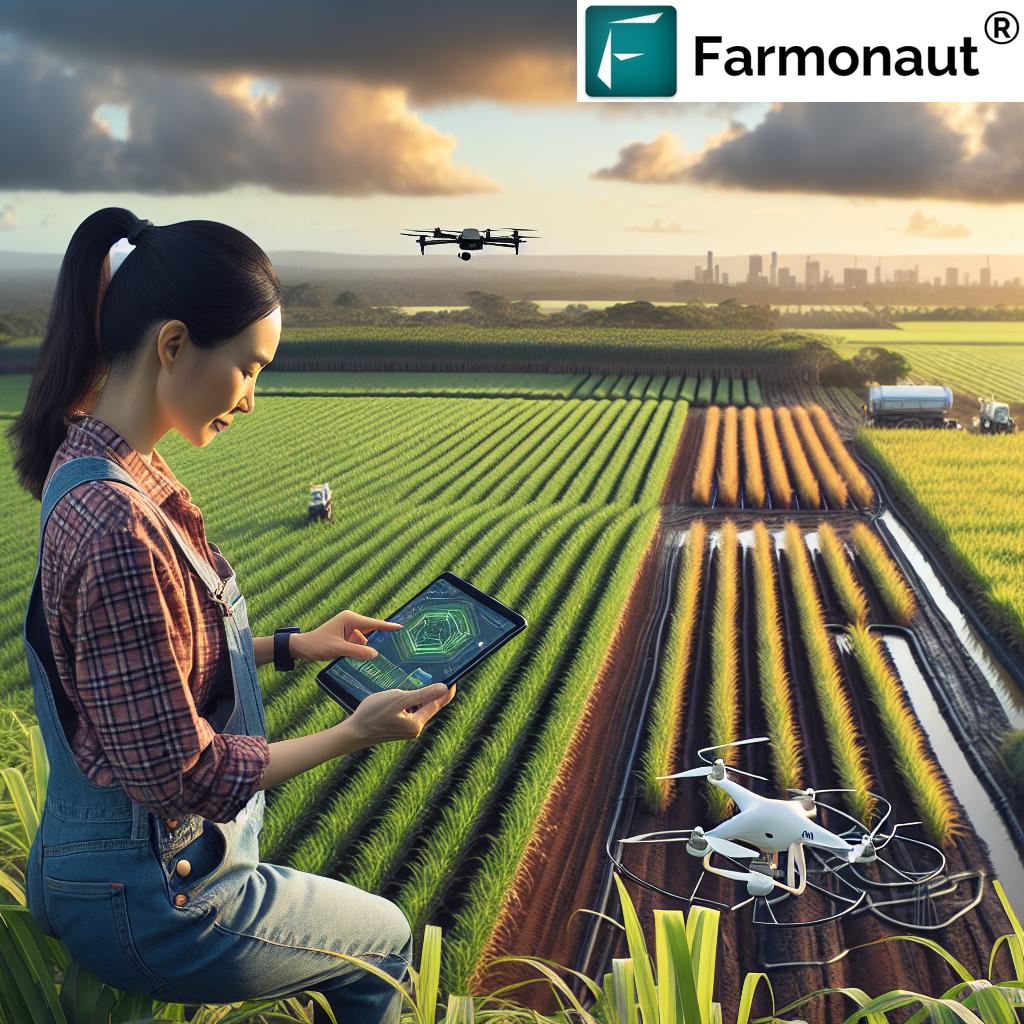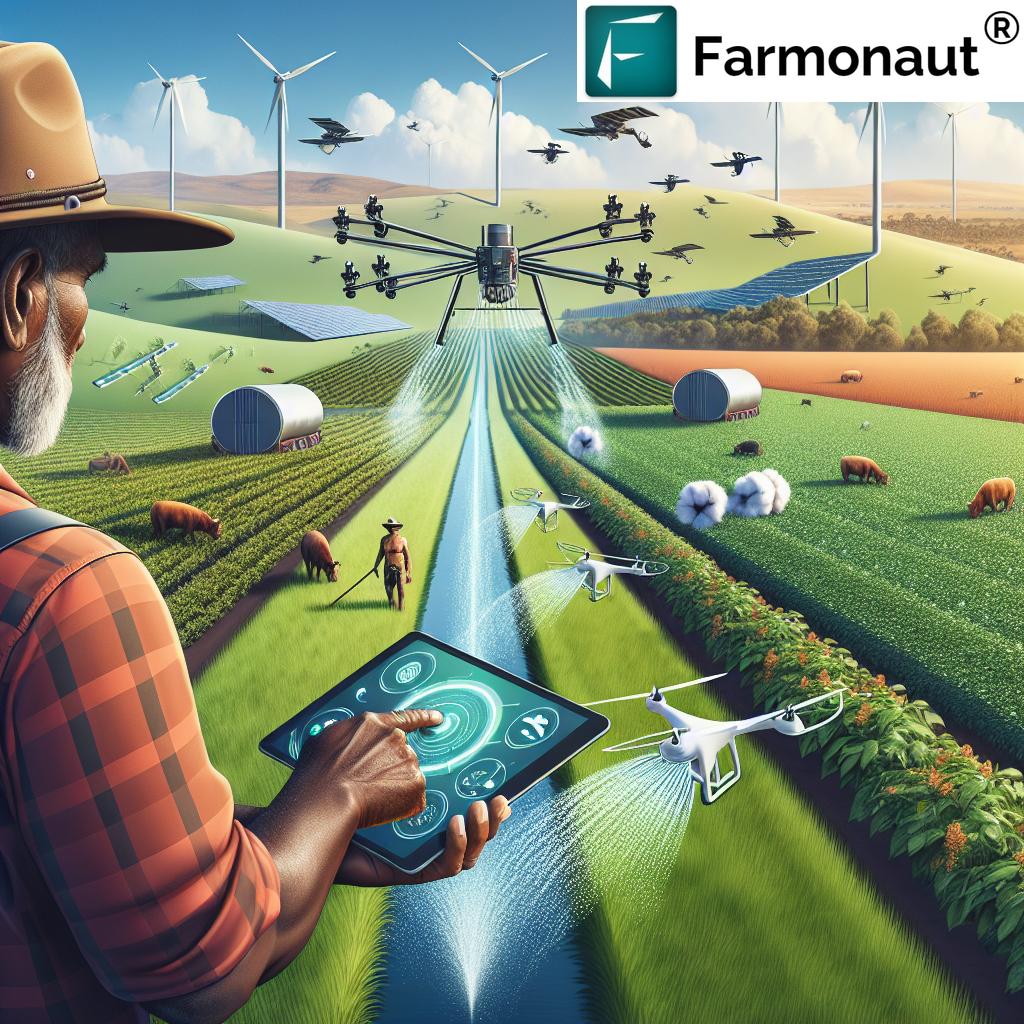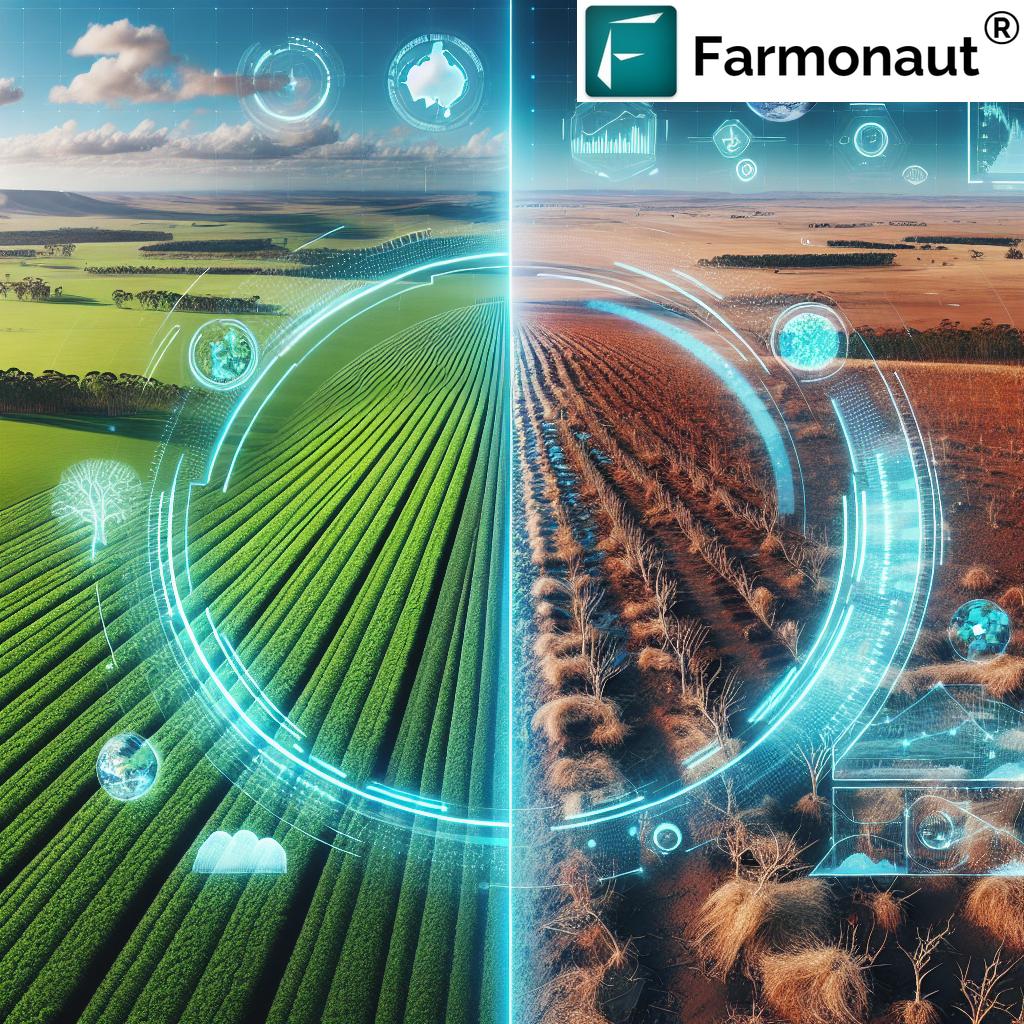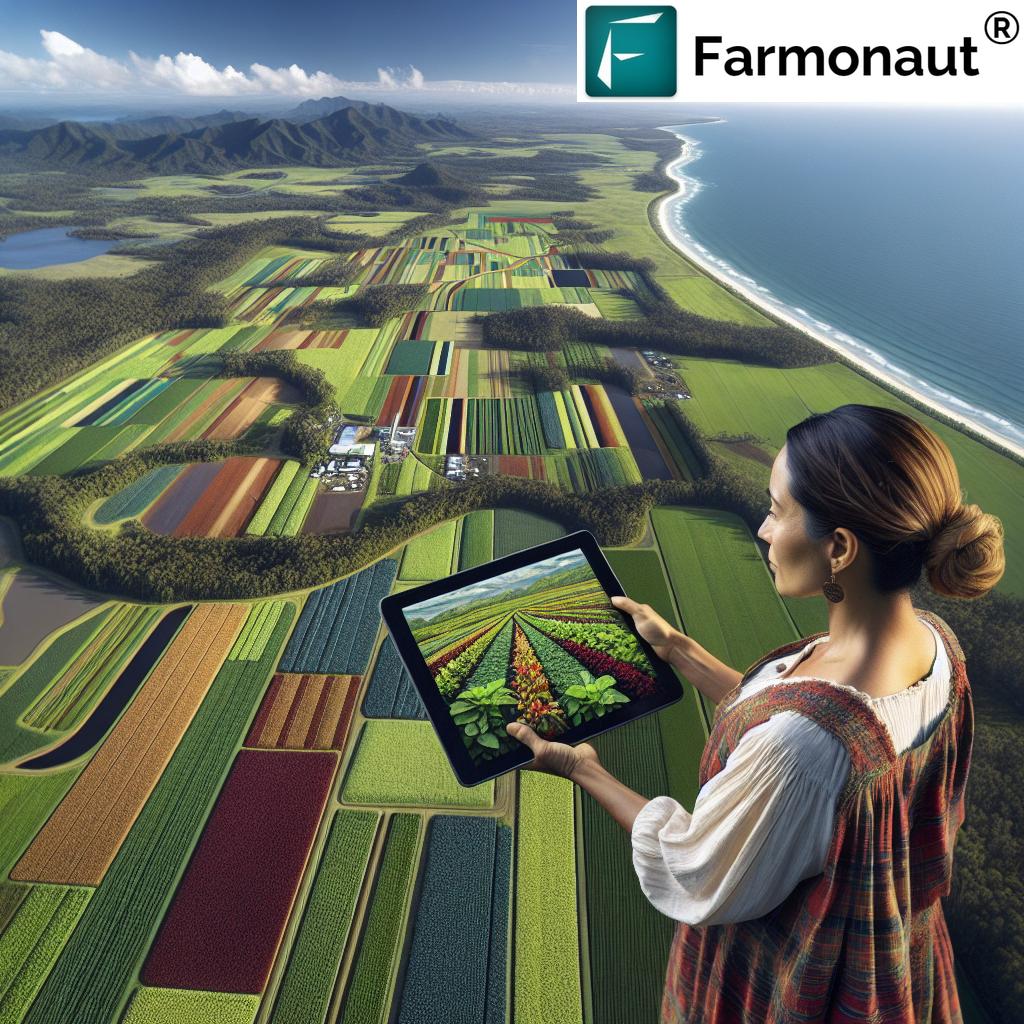Revolutionizing Australian Agriculture: How Farmonaut’s Precision Farming Technology Boosts Sustainability and Crop Monitoring
“Farmonaut’s precision farming technology has helped reduce water usage in Australian agriculture by up to 30%.”
Welcome to the future of farming in Australia! We’re excited to take you on a journey through the revolutionary world of precision agriculture and sustainable farming practices. In this comprehensive blog post, we’ll explore how cutting-edge technologies are transforming the agricultural landscape, with a special focus on Farmonaut’s innovative solutions that are making waves across the Australian continent.
The Dawn of Precision Farming in Australia
Australian agriculture has long been a cornerstone of the nation’s economy and identity. From the vast wheat fields of Western Australia to the lush vineyards of Victoria, our agricultural sector has always been at the forefront of innovation. Today, we’re witnessing a new era in farming, one that combines traditional knowledge with state-of-the-art technology to create more sustainable, efficient, and productive agricultural practices.
Precision farming technology is at the heart of this agricultural revolution. By leveraging advanced tools such as satellite imagery, artificial intelligence, and data analytics, farmers can now make informed decisions about every aspect of their operations. This level of precision allows for optimized resource use, improved crop yields, and a significant reduction in environmental impact.
Farmonaut: Pioneering Sustainable Agriculture in Australia
At the forefront of this technological revolution is Farmonaut, a company that’s making waves in the Australian agricultural sector. Farmonaut’s mission is to make precision agriculture accessible and affordable for farmers across the country, regardless of the size of their operations.
Farmonaut’s platform integrates cutting-edge technologies to provide farmers with real-time insights and actionable data. Let’s delve into some of the key features that are transforming Australian agriculture:
- Satellite-Based Crop Health Monitoring: Utilizing multispectral satellite imagery, Farmonaut offers farmers a bird’s-eye view of their crops’ health. This technology allows for early detection of issues such as pest infestations, nutrient deficiencies, and water stress.
- AI-Powered Advisory System: Farmonaut’s Jeevn AI system provides personalized recommendations based on real-time data, helping farmers make informed decisions about irrigation, fertilization, and pest management.
- Blockchain-Based Traceability: In an era where consumers demand transparency, Farmonaut’s blockchain technology ensures that every step of the agricultural process can be traced and verified.
- Smart Resource Management: From optimizing water usage to managing fleet operations, Farmonaut’s tools help farmers maximize efficiency and minimize waste.
These innovative solutions are not just improving farm productivity; they’re also playing a crucial role in promoting sustainable agriculture practices across Australia.
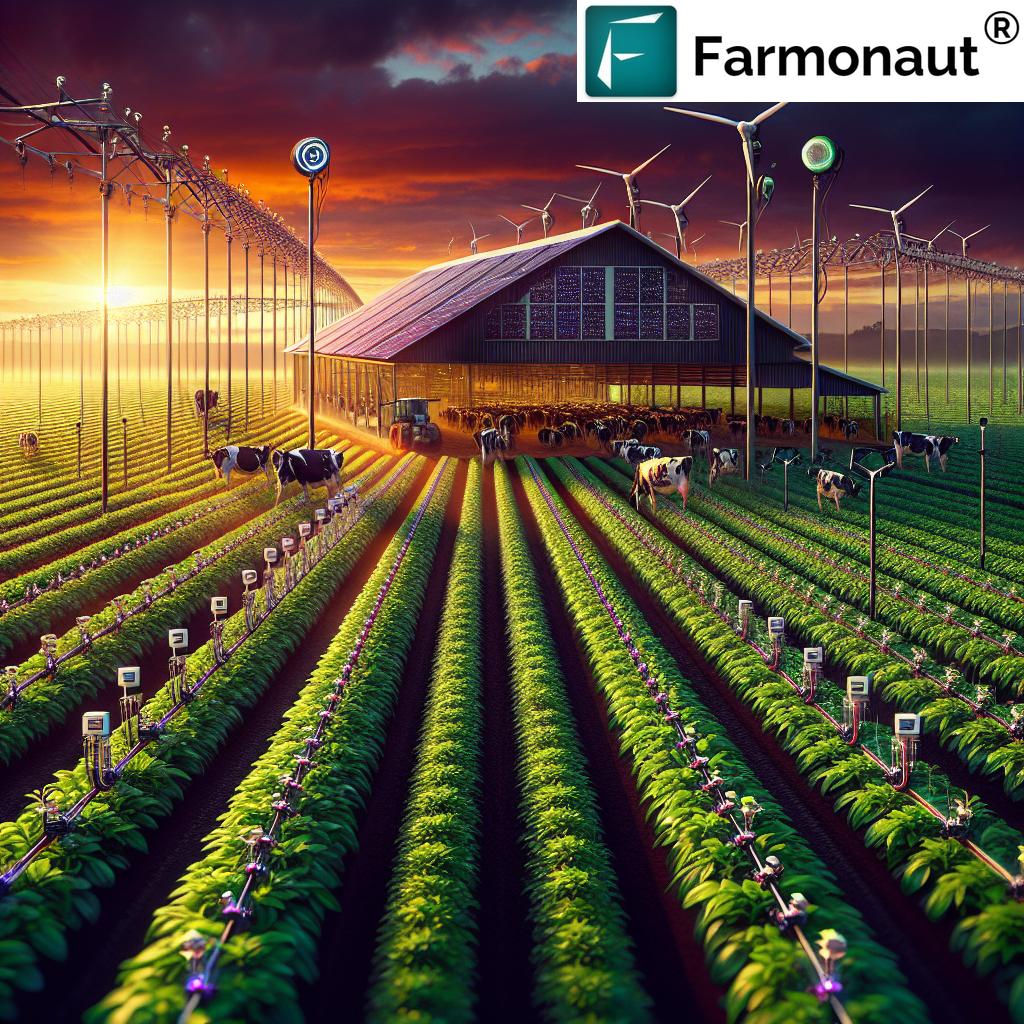
The Impact of Precision Farming on Australian Agriculture
The adoption of precision farming technologies, like those offered by Farmonaut, is having a profound impact on Australian agriculture. Let’s explore some of the key areas where we’re seeing significant improvements:
Water Conservation
In a country as dry as Australia, water conservation is paramount. Precision farming technologies are enabling farmers to use water more efficiently than ever before. By providing real-time data on soil moisture levels and crop water requirements, Farmonaut’s platform allows for precise irrigation scheduling. This not only conserves water but also improves crop health by ensuring plants receive the right amount of water at the right time.
Soil Health Optimization
Healthy soil is the foundation of sustainable agriculture. Farmonaut’s soil health monitoring capabilities allow farmers to track key soil parameters such as nutrient levels, pH, and organic matter content. This information enables targeted interventions to improve soil health, reducing the need for chemical fertilizers and promoting long-term soil fertility.
Pest and Disease Management
Early detection is crucial in managing pests and diseases. Farmonaut’s satellite-based crop monitoring system can identify potential issues before they become visible to the naked eye. This allows farmers to take swift action, often reducing the need for broad-spectrum pesticides and promoting more environmentally friendly pest management strategies.
Carbon Footprint Reduction
As the world grapples with climate change, reducing agriculture’s carbon footprint is more important than ever. Farmonaut’s precision farming tools help farmers optimize their operations, reducing unnecessary tractor passes, minimizing fertilizer use, and improving overall energy efficiency. This not only benefits the environment but also helps farmers reduce costs and improve their bottom line.
Crop Monitoring Systems: The Eyes in the Sky
One of the most revolutionary aspects of precision farming is the use of advanced crop monitoring systems. These systems, which often rely on satellite imagery and drone technology, provide farmers with unprecedented insights into their crops’ health and development.
Farmonaut’s crop monitoring system is at the cutting edge of this technology. By analyzing multispectral satellite images, the system can detect variations in crop health across entire fields. This information is presented to farmers through easy-to-understand vegetation indices, such as the Normalized Difference Vegetation Index (NDVI).
The benefits of such detailed crop monitoring are numerous:
- Early Problem Detection: Issues such as nutrient deficiencies, pest infestations, or irrigation problems can be identified early, often before they’re visible to the naked eye.
- Targeted Interventions: Rather than treating entire fields uniformly, farmers can target specific areas that need attention, reducing waste and improving efficiency.
- Yield Forecasting: By tracking crop development over time, these systems can provide accurate yield forecasts, helping farmers plan their harvests and market their produce more effectively.
- Historical Analysis: The ability to compare current crop conditions with historical data allows farmers to make more informed long-term decisions about crop rotation, variety selection, and land use.
“Sustainable agriculture practices using Farmonaut’s software have increased crop yields by an average of 20% across Australia.”
Agricultural Data Analytics: Turning Information into Action
The true power of precision farming lies not just in collecting data, but in analyzing and interpreting that data to drive actionable insights. This is where agricultural data analytics comes into play, and it’s an area where Farmonaut truly shines.
Farmonaut’s platform doesn’t just present raw data to farmers; it uses advanced algorithms and machine learning techniques to provide meaningful insights and recommendations. Here’s how this works in practice:
- Data Collection: The system continuously collects data from various sources, including satellite imagery, weather stations, soil sensors, and farm equipment.
- Data Processing: This raw data is then processed and analyzed using sophisticated algorithms.
- Pattern Recognition: The system identifies patterns and trends that might not be apparent to the human eye.
- Predictive Analytics: Based on historical data and current conditions, the system can make predictions about future crop performance, potential risks, and optimal management strategies.
- Personalized Recommendations: Finally, all this information is synthesized into clear, actionable recommendations tailored to each farmer’s specific needs and conditions.
This data-driven approach to farming is revolutionizing decision-making processes on Australian farms. It’s allowing farmers to move away from gut feelings and generalized best practices towards a more scientific, evidence-based approach to agriculture.
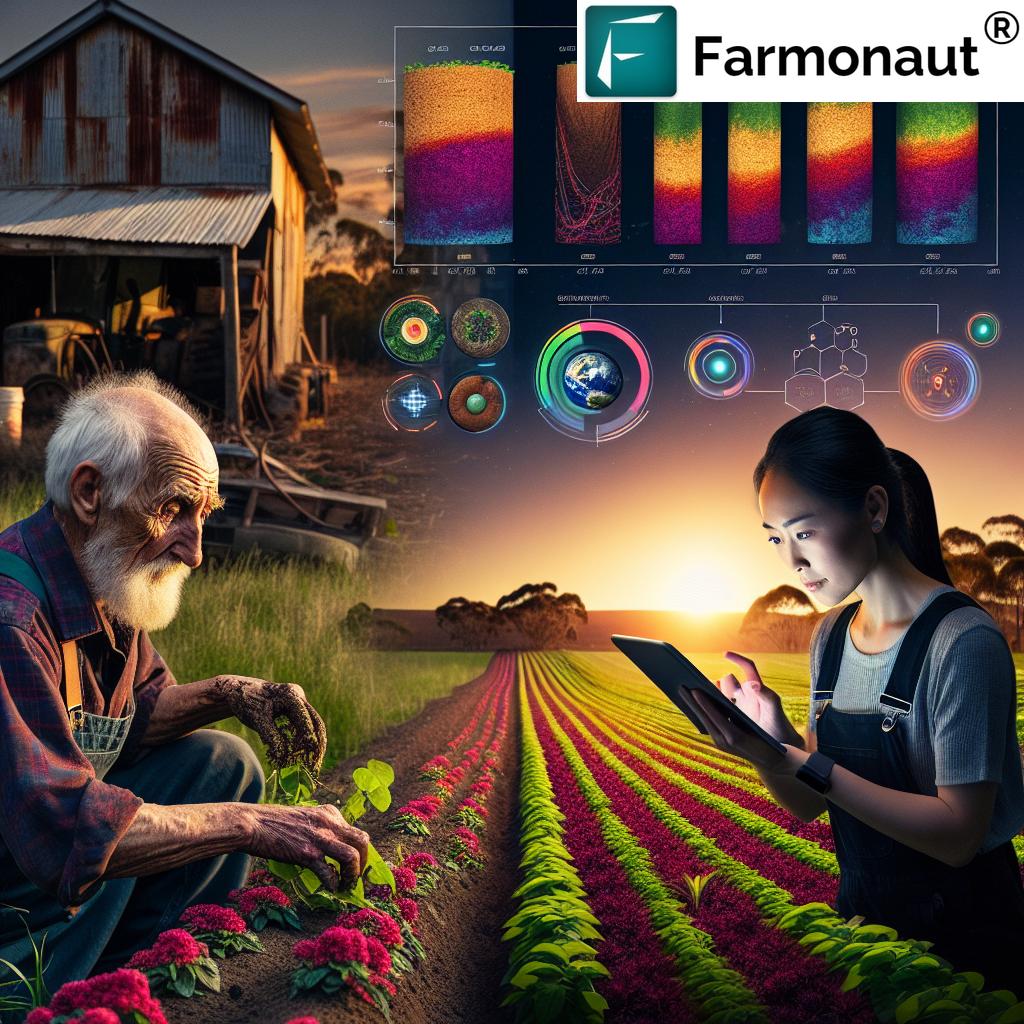
Farm Management Software: The Command Center of Modern Agriculture
At the heart of precision farming is farm management software, which serves as the central hub for all farming operations. Farmonaut’s farm management platform is designed to be user-friendly and accessible, allowing farmers to manage their entire operation from a single interface.
Key features of Farmonaut’s farm management software include:
- Field Mapping: Detailed, interactive maps of all farm fields, showing crop health, soil conditions, and other key parameters.
- Task Management: Tools for planning, assigning, and tracking farm tasks, ensuring efficient use of labor and resources.
- Record Keeping: Comprehensive systems for maintaining detailed records of all farm activities, from planting to harvesting.
- Financial Management: Tools for tracking expenses, revenues, and profitability at both the field and farm level.
- Compliance Tracking: Features to help farmers stay compliant with regulatory requirements and certification standards.
By centralizing all these functions in one platform, Farmonaut’s farm management software is helping Australian farmers streamline their operations, reduce paperwork, and make more informed decisions.
Ready to experience the power of Farmonaut’s precision farming technology? Try our web app today!

Smart Irrigation Solutions: Making Every Drop Count
In a country as drought-prone as Australia, efficient water use is crucial for sustainable agriculture. Farmonaut’s smart irrigation solutions are helping farmers optimize their water usage, ensuring that crops receive precisely the amount of water they need, when they need it.
Here’s how Farmonaut’s smart irrigation system works:
- Soil Moisture Monitoring: The system uses a combination of satellite data and ground sensors to monitor soil moisture levels in real-time.
- Weather Integration: Local weather forecasts are integrated into the system, allowing it to anticipate rainfall and adjust irrigation schedules accordingly.
- Crop-Specific Modeling: The system takes into account the specific water requirements of different crops at various growth stages.
- Automated Scheduling: Based on all this data, the system creates optimized irrigation schedules, which can be automatically implemented through connected irrigation systems.
- Performance Tracking: The system continuously monitors the effectiveness of irrigation events, allowing for ongoing refinement of irrigation strategies.
By implementing these smart irrigation solutions, Australian farmers are not only conserving water but also improving crop health and yields. Overwatering can be just as detrimental as underwatering, and Farmonaut’s precision approach ensures that crops receive exactly the right amount of water for optimal growth.
Drone Technology in Agriculture: A Bird’s-Eye View of Crop Health
While satellite imagery provides valuable broad-scale data, drone technology is offering Australian farmers an even more detailed view of their crops. Farmonaut’s platform integrates seamlessly with drone technology, allowing farmers to capture high-resolution images of their fields on demand.
The benefits of drone technology in agriculture include:
- Ultra-High Resolution Imaging: Drones can capture images with resolution as high as 1 cm per pixel, allowing for incredibly detailed crop analysis.
- Flexible Timing: Unlike satellites, which pass over at fixed intervals, drones can be deployed whenever needed, allowing for timely data collection.
- Multispectral Imaging: Many agricultural drones are equipped with multispectral cameras, which can detect light wavelengths invisible to the human eye, providing even more detailed insights into crop health.
- 3D Mapping: Drones can create accurate 3D models of fields, which is particularly useful for assessing drainage patterns and planning precision planting.
By incorporating drone data into its platform, Farmonaut is providing Australian farmers with an unprecedented level of detail in their crop monitoring, enabling even more precise and timely interventions.
Vertical Farming Innovations: The Future of Urban Agriculture
While much of Australian agriculture takes place on vast rural properties, vertical farming is emerging as an exciting frontier, particularly for urban and peri-urban areas. Farmonaut’s technology is adaptable to these innovative farming systems, helping to optimize resource use in these highly controlled environments.
Vertical farming offers several advantages:
- Year-Round Production: By controlling all aspects of the growing environment, vertical farms can produce crops year-round, regardless of outdoor conditions.
- Water Efficiency: Many vertical farming systems use hydroponic or aeroponic techniques, which can use up to 95% less water than traditional farming methods.
- Reduced Food Miles: By bringing food production closer to urban centers, vertical farming can significantly reduce transportation costs and associated emissions.
- Pest and Disease Control: The controlled environment of vertical farms reduces the need for pesticides and minimizes the risk of crop diseases.
Farmonaut’s precision farming technology is well-suited to the data-intensive nature of vertical farming. By providing real-time monitoring and AI-driven recommendations, Farmonaut is helping to make vertical farming more efficient and productive.
Agtech Startups: Driving Innovation in Australian Agriculture
The Australian agricultural technology (agtech) sector is booming, with startups like Farmonaut leading the charge in innovation. These agtech companies are playing a crucial role in modernizing Australian agriculture, bringing fresh ideas and cutting-edge technologies to the sector.
Key areas where agtech startups are making a difference include:
- Data Analytics: Developing sophisticated algorithms to turn farm data into actionable insights.
- IoT and Sensors: Creating networks of connected devices to monitor every aspect of farm operations.
- Robotics and Automation: Developing autonomous systems for tasks like planting, weeding, and harvesting.
- Biotechnology: Researching new crop varieties that are more resilient to pests, diseases, and climate change.
- Marketplace Platforms: Creating digital platforms to connect farmers directly with consumers or input suppliers.
Farmonaut, as a leading agtech startup, is at the forefront of this innovation wave. By continuously refining and expanding its offerings, Farmonaut is helping to shape the future of Australian agriculture.
For developers interested in integrating Farmonaut’s technology into their own solutions, check out our API and API Developer Docs.
Enhancing Transparency in Agricultural Processes
In today’s consumer-driven market, transparency in food production is more important than ever. Australian consumers want to know where their food comes from, how it was produced, and what impact its production had on the environment. Farmonaut’s blockchain-based traceability solutions are helping to meet this demand for transparency.
Here’s how Farmonaut’s traceability system works:
- Data Collection: Every step of the agricultural process, from planting to harvesting to processing, is recorded on the blockchain.
- Immutable Records: Once recorded, this information cannot be altered, ensuring its integrity.
- Easy Access: Consumers can access this information by scanning a QR code on the product packaging.
- Detailed Information: The system can provide information on factors like farming practices used, certifications obtained, and even the carbon footprint of the product.
This level of transparency not only builds consumer trust but also helps farmers demonstrate their commitment to sustainable and ethical farming practices. It’s a win-win situation that’s helping to strengthen the bond between Australian farmers and consumers.
Promoting Animal Welfare in Dairy and Poultry Sectors
While Farmonaut’s technology is primarily focused on crop farming, its principles of precision management and data-driven decision making are also being applied to animal agriculture, particularly in the dairy and poultry sectors.
In the dairy industry, precision farming technologies are being used to:
- Monitor Animal Health: Wearable sensors can track cow movement patterns and vital signs, alerting farmers to potential health issues early.
- Optimize Feeding: Automated systems can adjust feed rations based on each cow’s production level and nutritional needs.
- Improve Milking Efficiency: Robotic milking systems can milk cows on their own schedule, reducing stress and improving comfort.
In the poultry sector, precision technologies are helping to:
- Control Environmental Conditions: Automated systems maintain optimal temperature, humidity, and ventilation in poultry houses.
- Monitor Feed and Water Consumption: Precision feeders and waterers ensure birds have access to the right amount of food and water at all times.
- Track Bird Health: Advanced imaging systems can monitor bird behavior and detect potential health issues early.
By applying these precision farming principles to animal agriculture, Australian farmers are not only improving productivity but also enhancing animal welfare, ensuring that livestock are kept in optimal conditions for their health and well-being.
Comparative Analysis: Traditional vs. Precision Farming Methods
| Farming Aspect | Traditional Method | Precision Farming Method (using Farmonaut’s technology) | Sustainability Impact | Estimated Resource Savings (%) | Crop Yield Improvement (%) |
|---|---|---|---|---|---|
| Irrigation | Scheduled, uniform watering | Targeted irrigation based on real-time soil moisture data | Reduced water waste, improved water use efficiency | 30-50% | 10-25% |
| Fertilizer Application | Uniform application across fields | Variable rate application based on soil nutrient maps | Reduced chemical runoff, improved soil health | 20-40% | 5-15% |
| Pest Management | Regular, scheduled spraying | Targeted treatment based on early detection | Reduced pesticide use, preservation of beneficial insects | 40-60% | 10-20% |
| Yield Monitoring | End-of-season estimation | Continuous monitoring and prediction | Improved planning, reduced post-harvest losses | N/A | 15-30% |
| Crop Health Assessment | Visual inspection | Satellite and drone-based multispectral imaging | Early problem detection, optimized crop management | 20-30% (labor) | 10-20% |
The Future of Sustainable Agriculture in Australia
As we look to the future, it’s clear that precision farming technologies like those offered by Farmonaut will play an increasingly important role in Australian agriculture. These technologies are not just improving productivity and profitability; they’re also helping to address some of the most pressing challenges facing the agricultural sector, including climate change, water scarcity, and the need to feed a growing global population.
Some key trends we expect to see in the coming years include:
- Increased Adoption of AI and Machine Learning: As these technologies become more sophisticated, they’ll provide even more accurate predictions and recommendations for farmers.
- Integration of IoT Devices: The Internet of Things will continue to revolutionize farming, with networks of connected sensors providing real-time data on every aspect of farm operations.
- Advances in Genetic Engineering: CRISPR and other gene-editing technologies may lead to the development of crops that are more resilient to pests, diseases, and climate change.
- Growth of Vertical and Urban Farming: As technology improves and costs decrease, we may see more food production moving closer to urban centers.
- Increased Focus on Sustainability: With growing concerns about climate change, technologies that help reduce agriculture’s environmental impact will become increasingly important.
Farmonaut is committed to staying at the forefront of these trends, continuously innovating to provide Australian farmers with the tools they need to succeed in an ever-changing agricultural landscape.
Conclusion: Embracing the Future of Australian Agriculture
The agricultural revolution brought about by precision farming technologies is transforming the face of Australian agriculture. From vast outback stations to urban vertical farms, these technologies are helping farmers to produce more food, more sustainably, with fewer resources.
Farmonaut is proud to be at the forefront of this revolution, providing Australian farmers with the tools they need to navigate the challenges and opportunities of 21st-century agriculture. By combining cutting-edge technology with a deep understanding of agricultural practices, Farmonaut is helping to create a more sustainable, productive, and profitable future for Australian farming.
As we move forward, the continued adoption of precision farming technologies will be crucial in ensuring Australia’s agricultural sector remains competitive on the global stage while also meeting the growing demand for sustainable, ethically produced food.
Ready to join the precision farming revolution? Download Farmonaut’s mobile app today!


Frequently Asked Questions
- What is precision farming?
Precision farming is an approach to farm management that uses information technology to ensure that crops and soil receive exactly what they need for optimum health and productivity. - How does Farmonaut’s technology work?
Farmonaut uses satellite imagery, AI, and machine learning to provide farmers with real-time insights into their crops’ health, soil conditions, and other key factors affecting farm productivity. - Is Farmonaut’s technology suitable for small farms?
Yes, Farmonaut’s solutions are designed to be scalable and affordable, making them suitable for farms of all sizes. - How can precision farming help with water conservation?
Precision farming technologies like those offered by Farmonaut can help optimize irrigation by providing real-time data on soil moisture levels and crop water needs, allowing for more efficient water use. - What kind of support does Farmonaut offer to farmers?
Farmonaut provides comprehensive support including setup assistance, training on how to use the platform, and ongoing technical support.


